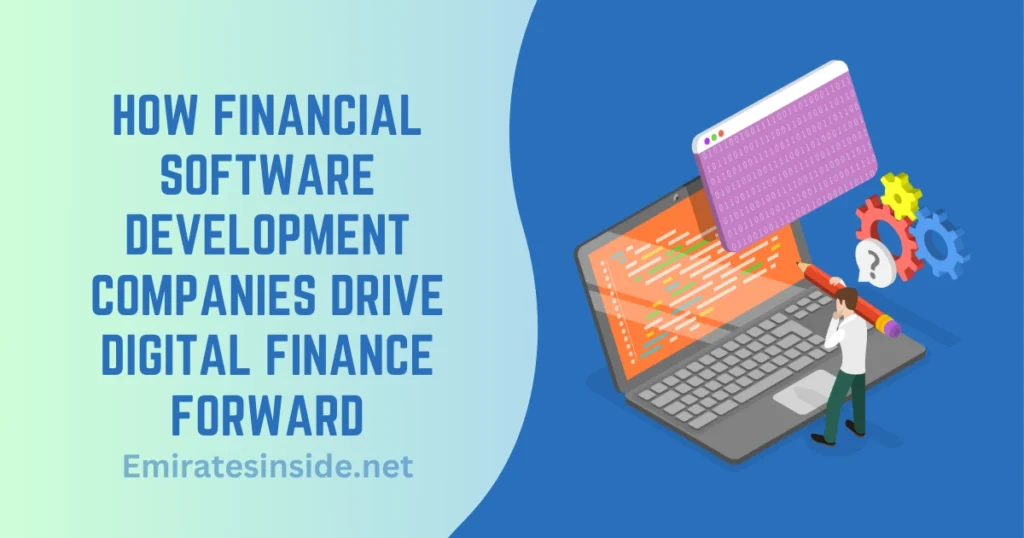How Financial Software Development Companies Drive Digital Finance Forward
Can a small fintech startup really compete with banking giants in the digital age? The answer is yes – if they have the right tech partner. In today’s fintech scene, forward-thinking startups, scale-ups, and even traditional banks are joining forces with financial software development companies to accelerate innovation. Why now? Because as technological disruption and shifting consumer behavior reshape finance, 2025 promises to be both challenging and opportunistic for financial services. To thrive, companies need to build cutting-edge digital products without wasting time – and that’s exactly where a financial software development company comes in, bringing specialized skills to turn bold ideas into impactful fintech solutions.

The Fintech Landscape: From Breakneck Growth to Sustainable Innovation
Over the past few years, fintech has seen explosive growth. Consider this: as of mid-2023, publicly traded fintech firms boasted a combined market cap of around $550 billion (twice the 2019 level), and there were 272 fintech “unicorns” worth nearly $936 billion in total – seven times more unicorns than just five years earlier. This surge reflects how fintech went mainstream, transforming how people manage money. Digital wallets, peer-to-peer payments, and app-based investing are now part of everyday life for millions.
Yet with rapid growth comes new challenges. Fintech companies large and small face a reality check: it’s not enough to sprint with one great app; you need to keep innovating efficiently for the long haul. That means building robust, scalable platforms and continuously improving the user experience, all while keeping costs in check. No easy feat!
This is where a financial software development company can be a game-changer. They enable fintech players to innovate faster and smarter. Instead of stretching a small in-house tech team to cover a dozen specialized areas (mobile app UX, backend integration, cybersecurity, etc.), a development partner provides on-demand expertise. They’ve built many fintech products before and can anticipate hurdles. Importantly, they bring a fresh outside perspective – having seen what works (and what fails) across the industry, they can guide you toward best-in-class solutions.
For established financial institutions, the landscape is similarly unforgiving. Neo-banks and fintech startups are nibbling at every profit center – from payments to loans – often with superior digital offerings. Banks know they must modernize legacy systems and deliver fintech-like experiences to stay relevant. Partnering with external innovators is often faster and more effective than doing everything internally. Many have opted to collaborate with software development firms or fintech specialists to revamp their tech stack and launch new services.
Building Fintech Solutions with Expert Help
Every successful fintech product starts as an idea – maybe it’s “what if we could offer loans via an app in 5 minutes” or “let’s use AI to personalize investment advice.” Turning that idea into a secure, user-friendly application is the hard part. Financial software development companies excel at this journey from concept to impact. How do they do it?
First, they bring structured development processes honed for fintech. A good partner will typically begin with a discovery and design phase – understanding your business model, target users, and regulatory needs. They might map out user journeys for your app (say, the steps a customer takes to open an account or make an investment) before writing a single line of code. This ensures the software truly meets user needs.
Next comes iterative development – often using Agile methodologies – which means you get to see the product take shape in frequent increments. For a fintech startup, this is invaluable. You can test a beta version of your app with early users or adjust features on the fly. The development company’s team (project managers, developers, QA testers, etc.) becomes an extension of your own team, but one that has done this many times before.
Crucially, financial software specialists emphasize quality assurance and security testing throughout. They know financial apps are high-stakes – a glitch in a trading platform or a security flaw in a banking app can be disastrous. So they conduct thorough testing: functionality tests, penetration tests for cybersecurity, load tests to ensure the system handles scale. By launch time, you have confidence that your product won’t crumble under real-world conditions.
Let’s look at some examples of what these development partners build across the fintech spectrum:
| Fintech Domain | Software Solution Examples |
| Digital Banking | Mobile banking apps; online banking portals; digital account-opening systems; personal finance dashboards for customers. |
| Payments & Transfers | Payment gateways for e-commerce; mobile wallets and QR payment apps; cross-border remittance platforms; real-time payment processing systems. |
| Wealth & Investing | Robo-advisor platforms for automated investing; stock trading and crypto trading apps; portfolio management dashboards for wealth managers. |
| Insurance (InsurTech) | Digital insurance policy management systems; claims filing and tracking apps with photo uploads; insurance quote comparison platforms. |
| Lending & Credit | Peer-to-peer lending marketplaces; digital loan origination systems (online loan applications, automated credit scoring); BNPL (Buy Now, Pay Later) integration for e-commerce. |
A financial software development company might be working on any of these solutions on a given day. The diversity is huge, but all share a need for rock-solid development and a deep understanding of financial transactions. Whether it’s enabling thousands of concurrent trades, or complying with specific regulations (like insurance laws or securities-trading rules), the development partner ensures those requirements are baked into the software design.
Embracing Emerging Technologies
Standing still in fintech is a recipe for obsolescence. The best financial software development firms help their clients embrace emerging technologies in a practical way – not as buzzwords, but as tools to solve real problems or create new value for users. Right now, there are several tech trends no fintech can ignore:
- Artificial Intelligence and Machine Learning: AI isn’t just hype – it’s delivering tangible benefits in finance. We’re talking about AI-powered fraud detection that scans millions of transactions for anomalies, or machine learning models that underwrite loans by analyzing alternative data. Industry watchers highlight trends ranging from pervasive AI (in back offices, chatbots, even generative AI advisors) to the rise of banking super-apps, as well as the emergence of central bank digital currencies and explorations of quantum computing in finance. A skilled development partner can integrate AI solutions or build custom models for your platform. But they’ll also ground you in reality – not every process needs a complex AI solution if a simpler automation will do. The key is knowing where AI can truly move the needle for your business.
- Blockchain and Digital Assets: A few years ago, blockchain was a wild frontier in fintech. Today, we’re seeing more concrete adoption. Stablecoins (cryptocurrencies pegged to fiat currency) are gaining traction as a “killer app” for cross-border payments, and major firms have made billion-dollar bets on crypto infrastructure. If your fintech idea involves digital assets – perhaps enabling crypto trading or using blockchain for transparent record-keeping – you’ll want developers who truly understand this tech. They must integrate with blockchain networks securely and handle digital wallets. As regulations slowly catch up, incorporating blockchain is gradually moving into the mainstream.
- Open Banking and APIs: Open banking (banks exposing data and services via APIs to trusted third parties) is a global movement. It allows fintech apps to securely connect to a user’s bank account (with permission) to pull in data or initiate payments. This has enabled a wave of innovations – budgeting apps aggregating all your finances, services that help you find better financial products, and more. For a development company, mastery of APIs – how to build them and how to consume them – is now standard. Many financial software firms build robust API integrations that connect disparate systems, stitching together a seamless experience for the end-user out of many building blocks.
- Cloud Computing and Scalability: Ten years ago, banks were wary of the cloud; now even the largest institutions embrace cloud infrastructure for its flexibility and cost efficiency. Modern fintech software is almost always built cloud-native. This means leveraging platforms like AWS, Azure, or Google Cloud for everything from data storage to machine learning. Development companies typically have cloud architects who design systems that auto-scale – so if your user base jumps from 10,000 to 100,000, the system dynamically adds capacity to handle the load. Cloud setups also support continuous delivery of updates, which is essential for staying competitive.
- UX and Customer-Centric Design: All the advanced tech in the world won’t save a fintech product that confuses or frustrates users. One could argue that user experience is a “technology” in its own right – the art and science of human-centric design. Fintech audiences expect slick, intuitive interfaces on par with the best consumer apps. Financial software teams often include UX/UI designers who specialize in simplifying complex financial tasks. The development partner ensures the final product is not only powerful under the hood, but also a pleasure to use.
In short, part of future-proofing fintech is adopting new technologies at the right time. Financial software development companies act as innovation scouts and implementers. They might advise, “Blockchain isn’t mature enough for that feature, let’s use a proven approach instead,” or conversely, “Integrating this new open-banking API could give your app a real edge.” This kind of guidance is invaluable when the tech landscape is constantly shifting.
Fintech Startups and Institutions Unite with Tech Partners
A notable trend in the industry is the blurring of lines between startups and incumbents – and between in-house and external development. Collaboration is the name of the game. Traditional banks are partnering with agile fintech companies or specialized vendors to launch new services, often under a “two-speed” approach: the bank handles the regulated core, while the partner drives fast innovation on the customer-facing side.
For example, a traditional bank launching a digital-only offshoot or a crypto service might enlist external developers who have done it before, rather than stretching their internal IT. In this efficient model, the bank offers the license and trust, while the tech partner delivers the product – each focusing on what they do best. Fintech startups likewise partner with big institutions for reach or licensing – for instance, a fintech app piggybacking on a bank’s license via Banking-as-a-Service. Here, the software development firm often handles the heavy integration work, making the startup’s platform talk securely to the bank’s systems behind the scenes.
In fact, many banks now have fintech partnership programs or innovation labs to co-create solutions. Financial software development companies often act as the bridge – fluent in the startup’s agile culture and the bank’s rigorous standards – ensuring the joint product works for both sides.
The Road Ahead: Agility, Resilience, and Continuous Improvement
Post-launch, user feedback and new needs will emerge. With an ongoing development partnership, you can continuously improve the product without losing momentum. Many fintechs keep their software partners around for the long haul, iterating and adding capabilities over time as their business grows.
Fintech is a fast-moving train, and it stops for no one. But you don’t have to jump on alone. By collaborating with a seasoned financial software development company, fintech entrepreneurs and financial institutions alike can harness the latest technologies, avoid pitfalls, and deliver exceptional digital experiences. It’s about building the future of finance together. In an industry that thrives on innovation, the right partnership can mean the difference between falling behind and forging ahead. Are you ready to future-proof your fintech journey?






